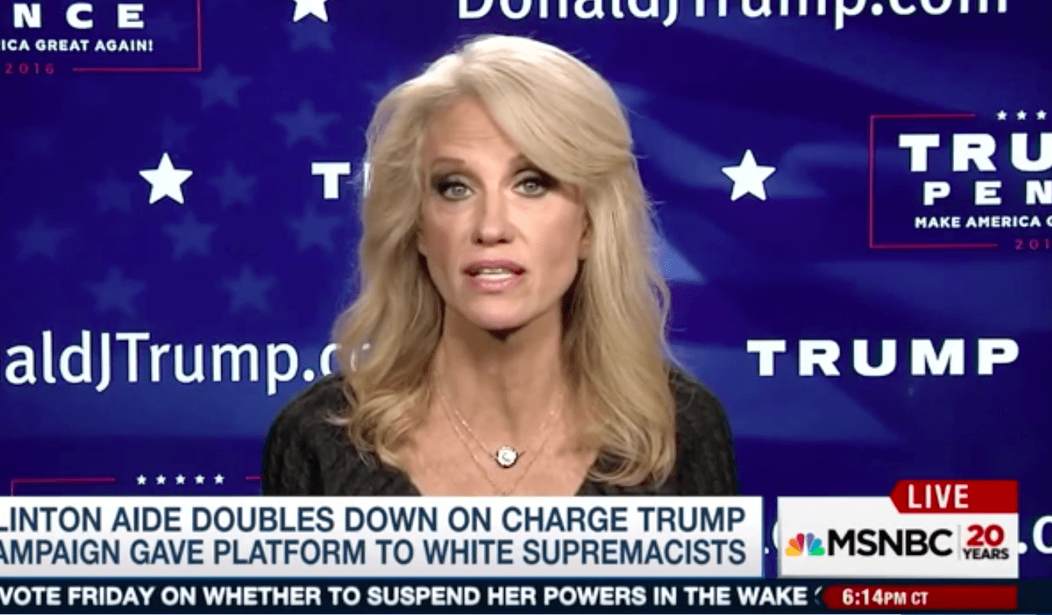On Thursday, a top adviser to President-elect Donald Trump said the repeated allegations that the Republican campaign provided a platform for white supremacy have resulted in death threats to her person.
Kellyanne Conway, Trump’s former campaign manager, reported the death threats on Chris Matthews’ MSNBC show “Hardball” Thursday night. Last week, former Clinton campaign advisers Jen Palmieri and Karen Finney looked Conway in the face and told her she provided a platform for white racism.
In the interview, Conway referenced a pair of op-eds in The Washington Post — one penned by Clinton campaign adviser Jen Palmieri explaining that Trump won the election because his campaign pandered to white supremacists, and one by Jonathan Capeheart which called out Conway by name: “Yes, Kellyanne Conway, you did provide a platform for white supremacy.”
Conway addressed these stories, saying Capehart’s story “is not true but did lead to some death threats today.” She repeated later on in the interview that she received death threats.
The former campaign manager admitted that Trump’s campaign reached out to “those working class voters who felt that they were the forgotten man or forgotten woman, they were the base of our support.” She credited this outreach for the fact that Clinton received “about 55-56 percent among women and not 60-65 percent, where she would have won.” Conway argued that Clinton’s status as a possible first woman president should have given her a stronger lead among women, but it didn’t.
Conway pointed to Clinton’s lack of a specific message as her campaign’s biggest flaw. “All they needed to do was have a compelling, sticky, relatable, aspirational message to the American people,” but they never had one. “All I heard was ‘We’re not Donald Trump.’ That’s not a message, that’s a screed.”
“We busted the ‘blue wall’ in states like Michigan, Pennsylvania, Wisconsin — and for them to pretend its because of [white supremacy] is not just insulting, it’s empirically false,” Conway declared. She attacked the Clinton team and Democrats in general for trying to avoid addressing the real reason why they lost.
Conway blamed the Clinton team for “scapegoating white supremacy, scapegoating [FBI Director] Jim Comey, Russian interference, fake news, Bernie Sanders.”
“Any time I respond, any time I defend myself against these specious allegations that are now leading to death threats — so I really resent it — any time I try to respond, I’m seen as ungracious,” Conway explained.
She asked, “Why are we sore winners? I’m not a sore winner. I’m a winner. My guy is a winner — he’s the next president of the United States.”
When Matthews expressed his hope that “the racists and the bad guys and the white nationalists stay away from your inauguration,” Conway insisted that Trump had explicitly distanced himself from them.
Donald Trump has denounced, many times including recently and very passionately, these white supremacists, these white nationalists, the Alt Right. … For those who want to hear it, they should hear it. For those who refuse to listen to it, please stop using it as an excuse.
Trump did indeed disavow the alt-right in a public statement to The New York Times last month. “I don’t want to energize the group, and I disavow the group,” Trump said.
Next Page: The complicated relationship between Trump and the alt-right.
Nevertheless, Trump’s campaign has received the support of many white supremacists, such as former Klu Klux Klan grand wizard David Duke. At the same time, alt-right leader Jared Taylor actually attacked Trump, saying he has never “taken up the cause of white identity, or talked openly about race and IQ.”
Taylor argued that while the alt-right sympathizes with Trump’s “views on immigration,” the candidate did not explicitly promote “white interests.”
This distinction is important. Since 2013, when the Republican “autopsy” document explaining Mitt Romney’s defeat in 2012 encouraged GOP candidates and lawmakers to favor immigration reform as a method of Hispanic outreach, a large segment of Americans who were concerned about the lawlessness of illegal immigrants have felt disenfranchised by the only party which had represented them. Trump, by promising to build a wall and take a hardline stance on the issue, energized these voters.
Anti-immigrant sentiment may or may not spring from racism against various immigrant groups. Many white people who are indeed racist saw in Trump a champion against non-white immigrants. And indeed, the candidate retweeted white nationalists during the campaign. Nevertheless, he did not promote the “white” issues endorsed by people like Taylor.
This might explain both the reasons why Clinton supporters attack Trump for connections to white supremacy, and why Conway takes such offense at those attacks. When Americans hear Palmieri and Capeheart connect Trump to white supremacy, they hear that he supports the “white interests” which people like Taylor actually attack Trump for not supporting.
The Trump campaign has coincided with the growth of the alt-right, and that is indeed a serious concern. Conway, who joined the campaign in August, likely had very little to do with this connection — a troubling sign that traced back to Trump’s primary campaign.
The real question is exactly how Trump himself is connected to the alt-right. He needs to govern in a way that puts any such fears to rest, and Conway’s voice will likely push him in the right direction.
Watch the video of Conway’s interview on the next page!
.@KellyannePolls talks to @HardballChris about receiving death threats and the need to end incendiary rhetoric https://t.co/wF6jv1b8nl
— Hardball (@hardball) December 9, 2016









Join the conversation as a VIP Member